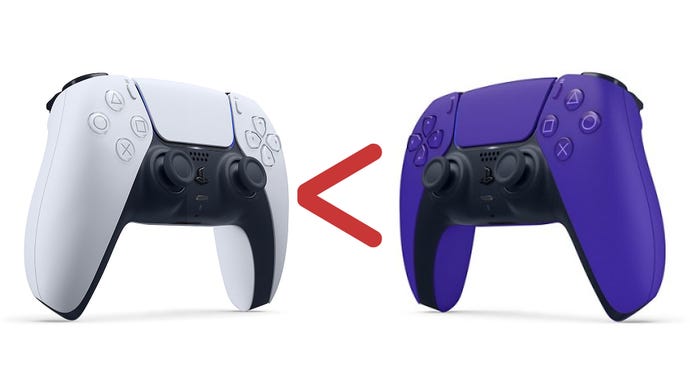With its new models, Sony has quietly updated the PS5 DualSense controller
The most recent line of DualSense pads have some slight upgrades – and new parts could mean less stick drift.
It's been over a year since we first heard about the DualSense's supposed 417 hour life and read a report that suggested the cause of stick drift in the pad. At the time, the report from iFixit suggested that a DualSense would start to degrade after an average of about seven months for most players. Not ideal, when the DualSense is $80 or £60 to buy new, right?
Well, Sony may have addressed the problem. At least partly. A new video from Youtuber TronicsFix has shown us under the hood of the latest pads – the ones that come in Nova Pink, Galactic Purple, Starlight Blue – and it seems that Sony has quietly improved the tech inside since the first wave of DualSense pads went out (thanks, GamesRadar).
Per TronicsFix, the new controllers are built with a slightly different spring which is loaded into the L and R buttons. In older models, the spring had a 0.25mm thickness, but these new ones are just a bit thicker at 0.3mm. This suggests that they'll be more durable, and hopefully inject the pad with more life.
The new line of controllers also feature a slightly different analog stick modules: per the video, Sony swapped a black piece of plastic in the sticks to an identical-looking green piece of plastic. It remains to be seen, but TropicsFix says this may – may – mitigate some stick drift issues.
Given that there are currently class-action lawsuits in progress in various countries around the world against both Sony and Nintendo regarding the 'important, serious and hidden defects' that underlie controller drift issues, it makes sense that Sony would want to improve the tech for its latest line of hardware.
It's a shame there's no improvement to the battery life, though – as our own Alex has previously noted, the pad's battery life isn't really what you'd expect from a modern-day bit of kit. Here's hoping Sony takes a look at battery life in the future, too.


